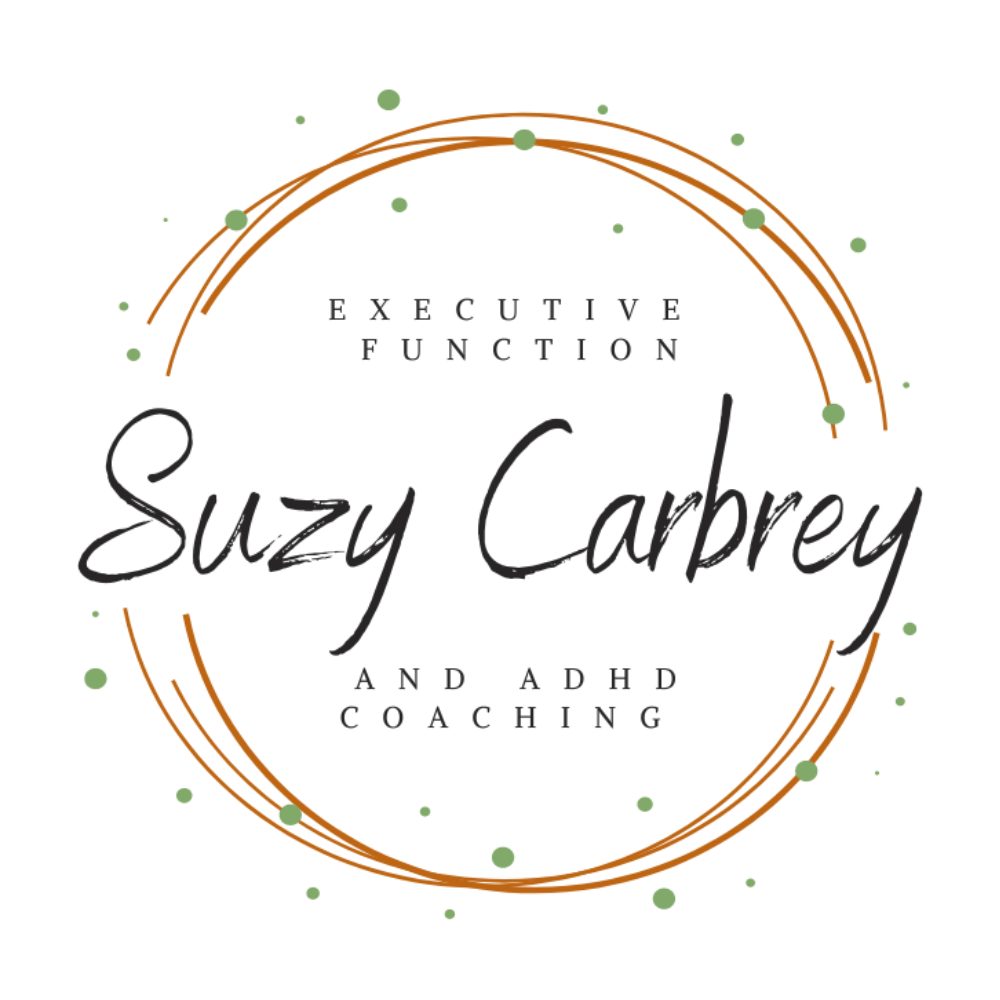Acceptance: A Key to Success with ADHD is written by Suzy Carbrey
In a world that often values conformity and quick fixes, the journey of acceptance stands out as a path of resilience and empowerment. For adults navigating life with ADHD, acceptance is not just about acknowledging a diagnosis; it’s about embracing a mindset that encourages growth, resilience, and inner peace.
Let’s start with this: ADHD does not need fixing. It’s a unique way of experiencing and interacting with the world. Understanding this is the first step towards a transformative journey—one that leads to better performance, improved quality of life, and a sense of calm focus that allows you to pursue your goals at your own pace and in your own way, free from shame and overwhelm.
But what does acceptance really mean in the context of ADHD? It’s not about giving up or just being okay with the way things are. It’s a powerful shift in perspective—a willingness to let go of the illusion of control and embrace the present moment with openness and curiosity. It’s about acknowledging and accepting your circumstances without judgment, without the constant struggle against your thoughts and emotions.
Why is acceptance so crucial? Because when we fight against our reality, we amplify our suffering. The constant battle to change ourselves or our circumstances only leads to frustration and exhaustion. Acceptance, on the other hand, opens the door to true transformation. It’s the foundation upon which personal growth can happen.

Imagine a life where you no longer judge yourself for being different, where you embrace your challenges as opportunities for growth, and where you speak to yourself with compassion rather than criticism. This is what acceptance is all about—the freedom to be the real you without apology.
Acceptance doesn’t mean giving up or settling. It’s about embracing your strengths and weaknesses, recognizing your unique gifts, and moving forward with intentionality. It is about shifting your focus from what you lack to what you have to offer the world.
One of the most powerful aspects of acceptance is its impact on emotional regulation. When we stop resisting who we are and the path we’re on, we free up valuable energy that can be channeled into positive action. Shame, overwhelm, and worry lose their grip when we embrace acceptance, realizing that they do nothing to help us and only hold us back.
Transforming Mindsets for Meaningful Growth for Acceptance

Accepting yourself and others is very important when changing from a fixed mindset to a growth mindset. It helps you grow and improve in many ways:
Embracing Challenges:
In a fixed mindset, challenges are often viewed as threats to one’s abilities or intelligence. Acceptance, however, allows you to see challenges as opportunities for growth and learning. Instead of avoiding difficulties, you approach them with a sense of curiosity and resilience, knowing that overcoming challenges leads to personal development.
Acceptance in Learning from Setbacks:
In a fixed mindset, setbacks and failures can be discouraging and damaging to self-esteem. Acceptance helps you reframe setbacks as valuable learning experiences. Rather than dwelling on mistakes or feeling defeated, you analyze what went wrong, extract lessons, and use that knowledge to improve and try again.
Effort and Persistence:
A growth mindset emphasizes the importance of effort and persistence in achieving goals. Acceptance encourages you to embrace the process of growth, understanding that progress may be gradual and require consistent effort over time. Instead of seeking instant perfection, you focus on continuous improvement and perseverance.
Feedback and Criticism in Acceptance:
In a fixed mindset, feedback and criticism can be taken personally and defensively. Acceptance allows you to receive feedback with an open mind, seeing it as constructive input rather than a judgment of your worth. You use feedback as a tool for growth, seeking opportunities to refine your skills and knowledge.
Adaptability and Flexibility:
A growth mindset is characterized by adaptability and flexibility in the face of challenges and changes. Acceptance helps you embrace uncertainty and unexpected outcomes without resistance. You adapt to new situations, adjust your strategies as needed, and remain open to alternative approaches to achieve your goals.
Acceptance & Celebrating Progress::
While a fixed mindset may focus solely on outcomes and comparisons with others, a growth mindset celebrates progress and effort. Acceptance allows you to acknowledge and celebrate small victories along the way, reinforcing a positive cycle of motivation and perseverance.
Self-Compassion and Resilience:
Acceptance promotes self-compassion by encouraging you to treat yourself kindly, especially during setbacks or failures. This self-compassion builds resilience, helping you bounce back from challenges with renewed determination and optimism.
.

Overall, acceptance fosters a mindset that supports meaningful progress by promoting a healthy relationship with challenges, setbacks, feedback, effort, and self-compassion. It enables you to cultivate resilience, embrace learning opportunities, and ultimately reach your full potential.
How to Cultivate Long-Term Acceptance in Your Life
Practicing acceptance and integrating it into your life long-term involves a combination of mindset shifts, daily habits, and ongoing self-awareness. Here are some practical steps to help you cultivate acceptance and make it a lasting part of your journey:
- Mindfulness and Self-Awareness: Start by developing a regular mindfulness practice. This could include meditation, deep breathing exercises, or simply taking moments throughout the day to pause and observe your thoughts and feelings without judgment. Cultivating self-awareness helps you recognize when you’re resisting reality or engaging in unhelpful patterns of thinking.
- Embrace Imperfection: Understand that perfection is an illusion. Embrace the idea that mistakes and setbacks are part of the human experience. When things don’t go as planned, instead of criticizing yourself, see it as an opportunity to learn and grow. Practice self-compassion by treating yourself with kindness and understanding.
- Challenge Negative Self-Talk: Pay attention to your internal dialogue. When you catch yourself engaging in negative self-talk or self-criticism, pause and reframe your thoughts. Replace harsh judgments with supportive and encouraging statements. For example, instead of saying, “I always mess up,” shift to “I’m learning and improving every day.”
- Practice Acceptance in Relationships: Extend the practice of acceptance to your interactions with others. Recognize that everyone has their own strengths, weaknesses, and perspectives. Practice empathy and understanding, especially in moments of conflict or disagreement. Accepting others as they are can foster healthier relationships and reduce unnecessary stress.


- Set Realistic Expectations: Avoid setting unrealistic expectations for yourself and others. Accept that progress takes time and effort. Set achievable goals and celebrate small victories along the way. Be gentle with yourself during times of transition or change.
- Focus on What You Can Control: Acceptance involves letting go of the need to control every outcome. Focus your energy on what you can control, such as your actions, attitudes, and responses to situations. Accept that some things are beyond your control, and practice resilience in the face of uncertainty.
- Cultivate Gratitude: Develop a practice of gratitude by regularly reflecting on the positive aspects of your life. Gratitude can shift your perspective and help you appreciate the present moment. Focus on what you have rather than dwelling on what you lack.
- Seek Support and Guidance: Don’t hesitate to seek support from trusted friends, family members, or mental health professionals. Talking about your challenges and feelings with others can provide valuable insights and encouragement. Surround yourself with people who accept and support you as you are.
- Practice Patience: Acceptance is a journey, and it takes time to fully integrate into your life. Be patient with yourself as you navigate this process. Allow yourself room for growth, learning, and occasional setbacks without judgment.
By consistently practicing these strategies and making acceptance an intentional part of your daily life, you can cultivate a mindset of resilience, self-compassion, and authentic living that lasts a lifetime.
Conclusion: Embrace Acceptance for a Transformative and Fulfilling Life with ADHD
In conclusion, acceptance is not merely a concept but a transformative way of life—an essential tool for realizing your full potential and leading a satisfying, purpose-driven existence. Embracing acceptance is more than a temporary change in mindset; it’s a profound journey that fundamentally alters our approach to challenges and setbacks. Recognizing that ADHD does not need fixing and that our unique perspectives are strengths, we establish a solid foundation for growth and resilience.
Transitioning from a fixed mindset to a growth mindset may be challenging, but acceptance facilitates this shift by encouraging us to welcome challenges, learn from failures, and persevere in our efforts. It enables us to view feedback as an opportunity for improvement rather than a judgment of our worth. By nurturing self-compassion and resilience, we face obstacles with composure and rebound from setbacks with renewed determination.
To integrate acceptance into our lives, we must engage in mindfulness practices, confront negative self-talk, and set realistic expectations. We must also extend acceptance to our relationships, fostering empathy and understanding. By focusing on what we can control and cultivating gratitude for the present moment, we embrace acceptance as a guiding principle in our daily lives.
Ultimately, acceptance is a journey of self-discovery and personal growth. It empowers us to live authentically, acknowledging our strengths and weaknesses, and celebrating progress along the way. By making acceptance an integral part of our daily habits and mindset, we open the door to meaningful progress and a fulfilling life journey.
Embrace acceptance, embrace yourself, and watch as transformation unfolds.

Learn more about Acceptance with Online Coaching for Executive Functioning / ADHD
Ready to gain control and enhance your executive functioning? As an experienced and compassionate coach, I specialize in providing support for executive functioning and ADHD. To embark on your journey, please reach out to me at 708-264-2899 or email hello@suzycarbrey.com to schedule a FREE 20-minute discovery call consultation.
With a background as a speech-language pathologist, I have a strong foundation in executive functioning coaching. My graduate degree program in SLP placed a significant emphasis on cognition, including executive functions, and I have years of experience in medical rehabilitation, providing cognitive-communication therapy. Additionally, I have completed an ADHD Services Provider certification program, I am Solutions-Focused Brief Therapy Diamond Level 1 certified and I am trained in the Seeing My Time® executive functioning curriculum.
Experience the convenience and effectiveness of online coaching, backed by studies that demonstrate equal results to in-person services. Parents, professionals, and emerging adults love the convenience and privacy of receiving coaching from their own homes.
Whether you reside in Chicago, Milwaukee, Indianapolis, Kansas City, or anywhere else around the globe, I am here to assist you. Schedule your discovery call consultation today, and I eagerly anticipate the opportunity to work with you!
Please note that although I am a certified speech-language pathologist, all services Suzy Carbrey LLC provides are strictly coaching and do not involve clinical evaluation or treatment services. If you require a formal speech therapy evaluation and treatment, please inform me, and I can provide appropriate recommendations.

